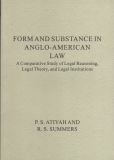用户登陆搜 索 |
查看图书
图书目录:Note on Terminology
Table of U.K. Cases Table of U.S. Cases 1. Introduction 1. Aims 2. Form and Substance in Legal Reasoning 3. Different Types of Formality in Legal Reasoning 4. Second-Level Substantive Reasons 5. Formal and Formalistic, Substantive and 'Substantivistic' Reasoning 6. Anglo-American Differences 7. The Background to the Differences 2. Standards for Determining the Authoritativeness of Law 1. IntroduCtion 2. Content-Oriented Standards of Validity 3. Conflicts between Otherwise Valid Laws 3. Rules and Other Varieties of Law 1. Introduction 2. The Nature and Role of Rules 3. The Flexibility of Rules 4. Two Conceptions of Rules 5. Legal Principles 4. Statute Law 1. The Inherent Formality of Statute Law 2. Statutory Interpretation 3. The Mandatory Formality of Statutes 5.The Common Law 1. Introduction 2. Stare Decisis: Differences 3. Some Explanations for the Differences 4. The Methodology of Legal Change 5. Public Law Litigation 6. The Trial Process 1. Introduction 2. The Trial as a Formal Fact-Finding Process 3. The Jury 4. Substantive Nullification of Formal Law 7. The Judicial Enforcement of Law 1. Introduction 2. The Accessibility of the Courts 3. Speed and Efficiency of the Judicial Process 4. The Finality and Enforcement of Judgments 5. Finality in Criminal Procedure 6. Due Process: A Possible Counter-example? 8. Legal Theories in England and America: 1776 1. English Legal Theory in 1776 ~ 2. American Legal Theory in 1776 9. Legal Theories in England and America: The Nineteenth and Twentieth Centuries 1. English Legal Theory in the Nineteenth Century 2. American Legal Theory in the Nineteenth Century 3. American Legal Theory 1900-1950 4. English Legal Theory 1900-1950 5. Contemporary Legal Theory 10. The Courts 1. The Function of Courts of Last Resort 2. Selection of Cases for Decision 3. Procedure of Appellate Courts 4. Law Clerks 5. Levels of Dissent 6. Lower Courts 11. The Makers and the Making of Statute Law 1. Introduction 2. The Relations between Executive and Legislature: England 3. The Relations between Executives and Legislatures: America 4. The Drafting of Legislation 5. Differences in Statute-Making: Some Illustrations 6. Differences in Legislative Personnel 12. The Judges 1. Introduction 2. Size and Structure of the Judiciary 3. Qualifications, Modes of Appointment, and Tenure 4. The Professionalization of the Judiciary 5. Diversity and Homogeneity in the Judiciary 13. The Legal Professions 1. Introduction 2. The English Bar: A Unique Institution 3. Attorneys and Solicitors 4. Qualifications of Lawyers and the Form- Substance Distinction 5. The Public Policy Role of Lawyers 14. Law Schools, Legal Education, and Legal Literature 1. Introduction 2. The Nature and Status of Law Schools 3. American and English Legal Education 4. The Policy Role of Law Professors 5. The Overall Influence of Law Schools 15. Concluding Remarks 1. Summary 2. Two Visions of Law 3. Universal Jurisprudence? 4. Evaluation and Criticism 5. Practical Reform--Especially 'Transplants' 6. Future Research Index |

